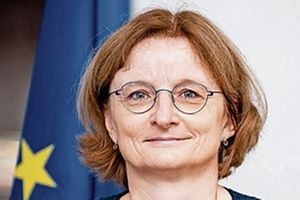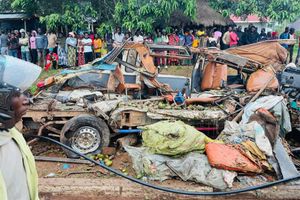From climate change to LGBTQ, Ruto tests his balancing act

Kenyan President William Ruto, left, with German chancellor Olaf Scholz, March 28, 2023. PHOTO | COURTESY
What you need to know:
- Ruto last week was testing his balancing act, touring Germany to speak about the need for money to fight climate change but also railing the West for railroading poor African countries into problems rich countries began
Kenya’s President William Ruto is making it known his true feelings about climate change and the rights of LGBTQ, even as he invites the West to invest in the country’s growing renewable energy sectors.
Ruto last week was testing his balancing act, touring Germany to speak about the need for money to fight climate change but also railing the West for railroading poor African countries into problems rich countries began.
One problem the Kenyan President wants tackled is climate change. But he says the West has made it look like a poor man’s problem.
“If we want to have a real chance at addressing the climate crisis, then we will need to rise to the challenge of genuine partnership,” he told an audience on Tuesday in Berlin, Germany.
“This means not pushing Africa further into the past and further into fossil fuel locking while failing to invest in real transition pathways towards a better brighter and cleaner future,” he said at the Berlin Energy Transition Dialogue (BETD), an international forum for key stakeholders of the energy sector, policymakers and other representatives where they converge to discuss environmentally responsible global energy transition.
“To avert the worst impacts of climate change and cap the increase in global temperature economies need to limit to “the increase in the global average temperature to 1.5°C above pre-industrial levels,” he added.
According to the Paris Agreement of 2015, emissions need to be reduced by 45 percent by 2030 and reach net zero by 2050.

Gas emissions. PHOTO | NMG
Renewable energy slowly progressing
Yet according to Ruto, the rollout of renewable energy in Africa is progressing slowly with difficulties in accessing finance for their development. Then there is the general problem of accessing any power available. This means African countries may bank on own resources, including the much-maligned fossil fuels.
“As such, the West has been pushing for abandonment of any fossil fuel projects. However, countries like Uganda and Tanzania have been defending their oil pipeline project meant to harvest oil resources in Uganda’s Lake Albert region for export. It is both a problem and a solution for Africa and richer countries need to invest in it,” Ruto argued.
“Africa's assets and ability to leapfrog technologically make the continent and Kenya in particular a critical partner, if we are all together going to navigate this next era of energy transition,” he added.
“Today in Africa, we face multiple intertwined crises. We are the continent most vulnerable to climate change and its impacts, yet least responsible for the climate change crisis. In addition, we have the least energy access with over 600 million Africans still without access to energy and of course, we are still carrying the scars of colonialism as well as economic and institutional dependencies that followed it.”

Cracked ground near the Sidi El Barrak dam with depleted levels of water in Nafza, west of Tunis in Tunisia on January 7, 2023. PHOTO | JIHED ABIDELLAOUI | REUTERS
The West is free to support these energy projects, something he says has also led to discrimination in credit access for the poor. But Ruto argues richer countries are giving attention only to certain problems while ignoring other crises.
“We have a raging war in the Democratic Republic of Congo (DRC) and in Somalia. We have challenges in Ethiopia and issues in South Sudan. We are all alone. For example, Kenya had to put its resources in deploying troops to DRC. We are currently hosting discussions to support the peace process in Ethiopia. We're working round the clock to see what we can do to support and train public officials as well as teachers for Somalia using our own public resources," Ruto said in a statement.
He referred to the Russian invasion in Ukraine for which Kenya roundly condemned, but opposed sanctions imposed on Moscow. Now, he says the war needs to end as no one is benefiting from it.
“Our position is that this is neither about the north nor the south. It's between what is right and what is wrong. We just need to stop it. Let's find a mechanism to put it to an end so that we can stop the victims of this war increasing. They are victim countries who cannot access food and like Kenya that cannot access fertilizer and grains,” he told German state broadcaster DW in an interview.
After airing out his view on the Ukraine issue, Ruto said the real elephant in the room is saving the planet from the effects of climate change and debt discussion crippling many countries in the global south because of International Financial system (IFS) skewed for the rich.
‘We have taken a position’
However, Ruto says no country should impose the idea of LGBTQ on his country, picking a page from Kenya’s neighbour Uganda who have dismissed the West’s pressure not to pass a tougher law on gay sex.

Uganda's parliament session during the proposal of the Anti-Homosexuality bill on March 9, 2023. PHOTO | ABUBAKER LUBOWA | REUTERS
“We cannot dictate to Germans, Americans, French or Ugandans on what they want to do. That is theirs to choose. As a country, we have taken a position informed by our culture, our tradition, our constitution, and laws,” he argued in the interview.
“In Kenya, the only understanding of relationships around marriage is around men marrying women. That's the context of a relationship that exists in Kenya and in our constitution. We have no issue with people celebrating their issues in America and in other countries for that is their choosing,” he added.
Uganda’s parliament recently passed a new bill against the LGBTQ community but yet to be signed into law. Kenya’s Supreme Court in February ruled that a lobby for LGBTQ had a right to register their organisation and lobby for legal changes favourable to them. Ruto has since opposed the decision.





